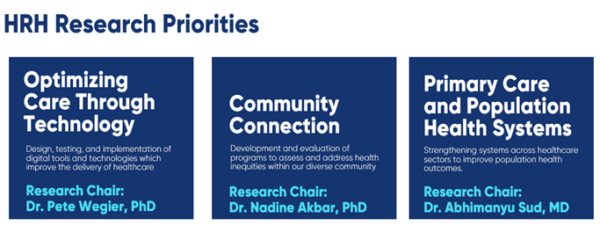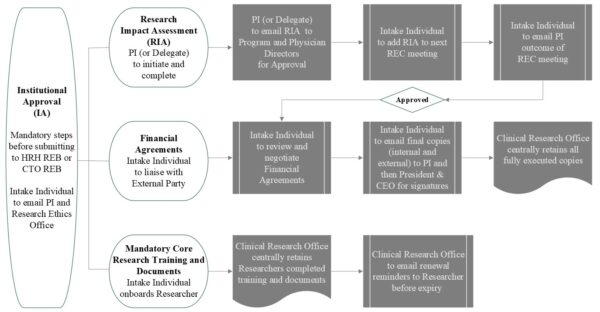
We are pleased to announce Dr. Abhimanyu Sud as the inaugural Humber River Health Research Chair in Primary Care and Population Health Systems. Dr. Sud is a family physician and health services researcher, and is an Assistant Professor in the Department of Family and Community Medicine at the University of Toronto. Dr. Sud’s program of research focuses on the development and evaluation of clinical interventions for improving population health outcomes. He is currently leading several clinical trials and the development of interventions focusing on improving the health of people living with chronic pain, mental illness, and opioid use. He is also a nationally recognized and awarded medical educator, and has pioneered innovative approaches to developing and evaluating continuing medical education programs as health policy interventions. He currently serves as the Co-Chair of the Interprofessional Pain Curriculum at the University of Toronto, and has acted as an expert contributor to several national pain and opioid prescribing education programs. Dr. Sud begins this new Research Chair role on January 31, 2022.
Dr. Sud’s arrival completes the third and final research chair recruitment, and the third priority of Humber River Health’s Research Strategy.


Dr. Nadine Akbar is the Humber River Health Research Chair in Community Connection. Dr. Akbar completed her undergraduate training in Psychology, followed by a Master’s and PhD in Medical Sciences, all completed at the University of Toronto. She then went on to conduct postdoctoral fellowships at Kessler Foundation, University Health Network and Queen’s University. She still maintains an Adjunct appointment at Queen’s University in the School of Rehabilitation Therapy. Dr. Akbar has conducted multi-disciplinary research at a number of healthcare institutions including Sunnybrook Health Sciences Centre, the Hospital for Sick Children, and Baycrest. She has also previously received research funding from agencies such as the Canadian Institutes of Health Research, the Multiple Sclerosis Society of Canada, the Multiple Sclerosis International Foundation, and Government of Ontario and has over 20 publications. The current emphasis of Dr. Akbar’s research program is on the use of community-based participatory research approaches to improve chronic disease health outcomes and advance health equity. Current projects include examining the impact of Long-COVID on racialized communities, development and evaluation of programs aimed at addressing loneliness and social isolation in older adults with mental health difficulties, and examining the impact of bariatric surgery on cognitive and psychological functioning.
Notable works:
Akbar, N. & Finlayson, M. (2021). A mixed-methods study of cognitive performance in persons with multiple sclerosis: Association between neuropsychological test performance and interviews about daily cognitive functioning. Multiple Sclerosis and Related Disorders. 52: 102911. Available at: https://doi.org/10.1016/j.msard.2021.102911
Akbar, N., Hazlewood, S., Clement, M., Pollock, G., Canning, K., Latimer-Cheung, A.E., Hicks, A., & Finlayson, M. (2021). Experiences and perceived outcomes of persons with multiple sclerosis from participating in a randomized controlled trial testing implementation of the Canadian Physical Activity Guidelines for Adults with MS: An embedded qualitative study. Disability and Rehabilitation. Available at: https://doi.org/10.1080/09638288.2021.1914199
Akbar, N., Turpin, K., Petrin, J., Smyth, P., & Finlayson. (2018). A pilot mixed-methods evaluation of MS INFoRm: An interactive fatigue management resource for persons with multiple sclerosis. International Journal of Rehabilitation Research. 2018;41(2):114-121. Available at: https://journals.lww.com/intjrehabilres/Abstract/2018/06000/A_pilot_mixed_methods_evaluation_of_MS_INFoRm__a.4.aspx

Dr. Pete Wegier is the Humber River Health Research Chair in Optimizing Care Through Technology and an Assistant Professor at the University of Toronto. Using a combination of information design, medical informatics, and decision science, Pete designs and implements technology-mediated solutions to improve healthcare and medical decision making. He currently co-leads the implementation of HOMR—a hospital-based mortality prediction model for the timely identification of patients with unmet palliative needs—at over 20 hospitals across Ontario. He has designed and built data displays for shared decision making around hypertension, patient-facing education material for hip fractures, methods for the visualization of polypharmacy, and experience-based approaches for risk communication. Pete has published nearly 30 papers and secured over $5 million in research funding.
Notable works:
Novel Visualizations of Healthcare Data
Wegier P, Belden JL, Canfield SM, Shaffer VA, Patil SJ, LeFevre ML, Valentine KD, Popescu M, Steege LM, Jain A, Hathaway AM, Koopman RJ. Graphing home blood pressure data for the management of hypertension: Using human factors & design principles. BMC Medical Informatics and Decision Making. 2021 Aug; 21(235)[https://bmcmedinformdecismak.biomedcentral.com/track/pdf/10.1186/s12911-021-01598-4.pdf]
Koopman RJ, Canfield SM, Patil SJ, Belden JL, Wegier P, Shaffer VA, Steege LM, Popescu M, Valentine KD, Jain A, Hathaway AM, LeFevre ML. Graphing home blood pressure data for the management of hypertension: Designing for patient & physician information needs. BMC Medical Informatics and Decision Making. 2020 Aug; 20(195). [https://bmcmedinformdecismak.biomedcentral.com/track/pdf/10.1186/s12911-020-01194-y.pdf]
Shaffer VA, Wegier P, Valentine KD, Belden JL, Canfield SM, Popescu M, Steege LM, Jain A, Koopman RJ. Use of shared data visualization to improve judgments about hypertension control. Medical Decision Making. 2020 July; 40(6). [https://journals.sagepub.com/doi/10.1177/0272989X20940999]
Belden JL, Wegier P, Patel J, Hutson A, Plaisant C, Moore J, Lowrance N, Boren S, Koopman RJ. Designing a medication timeline for patients and physicians. Journal of the American Medical Informatics Association. 2019 Feb; 26(2): 95–105. [https://academic.oup.com/jamia/article/26/2/95/5260829]
Timely Identification of Patients with Unmet Palliative Needs
Wegier P, Kurahashi A, Saunders S, Lokuge B, Steinberg L, Myers J, Koo E, van Walraven C, Downar J. mHOMR: An automated mortality prediction tool can identify patients with unmet palliative needs. BMJ Supportive & Palliative Care. In press. [https://spcare.bmj.com/content/early/2021/05/03/bmjspcare-2020-002870]
Saunders S, Downar J, Subramaniam S, Embuldeniya G, van Walraven C, Wegier P. mHOMR: A qualitative study on the acceptability of an automated mortality prediction tool for timely identification for palliative care. BMJ Quality & Safety. In press. [https://qualitysafety.bmj.com/content/early/2021/02/25/bmjqs-2020-012461]
Wegier P, Koo E, Ansari S, Kobewka DM, O’Connor E, Wu P, Steinberg L, Bell CM, Walton T, van Walraven C, Embuldeniya G, Costello J, Downar J. mHOMR: A feasibility study of an automated system for identifying inpatients having an elevated risk of one-year mortality. BMJ Quality & Safety. 2019 Nov; 28(12): 971–979. [https://qualitysafety.bmj.com/content/28/12/971]
Risk Communication
Wegier P, Armstrong BA, Shaffer VA. Aiding Risk Information learning through Simulated Experience (ARISE): A comparison of the communication of diagnostic screening test information in explicit and simulated experience formats. Medical Decision Making. 2019 Apr; 39(3): 196–207. [https://journals.sagepub.com/doi/10.1177/0272989X19832882]
Wegier P, Shaffer VA. Aiding risk information learning through simulated experience (ARISE): Using simulated outcomes to improve understanding of conditional probabilities in prenatal Down syndrome screening. Patient Education and Counseling. 2017 Oct; 100(100): 1882–1889. [https://www.sciencedirect.com/science/article/pii/S0738399117302501?via%3Dihub]





